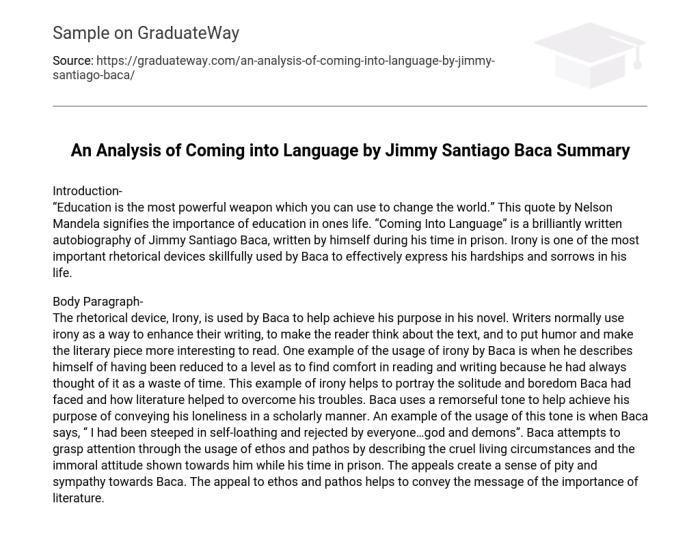Coming into language jimmy santiago baca – Coming into Language: The Literary Journey of Jimmy Santiago Baca delves into the profound impact of personal narratives and cultural identity on Baca’s evocative and socially conscious body of work.
Baca’s unique poetic forms and styles, deeply rooted in his Chicano heritage and working-class upbringing, challenge dominant narratives and explore the complexities of language as a tool for empowerment and resistance.
Personal Narrative and Cultural Identity

Baca’s writing is deeply rooted in his personal experiences and cultural background. His work often explores themes of identity, family, and community, drawing inspiration from his upbringing in a working-class Chicano family in New Mexico.
Chicano Heritage
- Baca’s poetry celebrates the rich traditions and culture of his Chicano heritage, reflecting his pride and connection to his community.
- He uses Spanish language and imagery throughout his work, weaving together elements of both English and Spanish to create a unique and authentic voice.
Working-Class Upbringing
- Baca’s writing often portrays the struggles and challenges faced by working-class communities.
- He depicts the resilience and determination of ordinary people, highlighting their ability to overcome adversity and find hope amidst difficult circumstances.
Language and Power

Baca’s writing demonstrates a profound understanding of the power of language. He uses language as a tool for empowerment and resistance, challenging dominant narratives and exploring the complexities of language itself.
Empowerment and Resistance
- Baca’s poetry empowers marginalized communities by giving voice to their experiences and perspectives.
- He uses language to challenge oppressive systems and promote social justice.
Challenging Dominant Narratives, Coming into language jimmy santiago baca
- Baca’s writing critiques mainstream narratives that often exclude or misrepresent the experiences of minority groups.
- He presents alternative perspectives and challenges stereotypes, offering a more nuanced and inclusive understanding of society.
Social Justice and Advocacy: Coming Into Language Jimmy Santiago Baca

Baca was a passionate advocate for social justice and an outspoken critic of poverty, racism, and social inequality. His writing reflects his deep commitment to these causes.
Addressing Social Issues
- Baca’s poetry confronts social injustices head-on, exposing the realities of poverty, discrimination, and violence.
- He uses his writing to raise awareness and call for change.
Activism and Advocacy
- Baca was an active participant in social justice movements, using his platform as a poet to speak out against oppression and promote equality.
- His writing continues to inspire and mobilize activists and advocates today.
Q&A
What is the significance of personal experiences in Baca’s writing?
Baca’s personal experiences, including his Chicano heritage and working-class upbringing, deeply inform his writing, providing a rich tapestry of cultural and social insights.
How does Baca use language as a tool for empowerment?
Baca’s use of language challenges dominant narratives and explores its power to empower marginalized communities, giving voice to their experiences and perspectives.
What are the key themes explored in Baca’s work?
Baca’s work explores themes of identity, social justice, poverty, racism, and the transformative power of language, shedding light on the struggles and resilience of marginalized communities.
